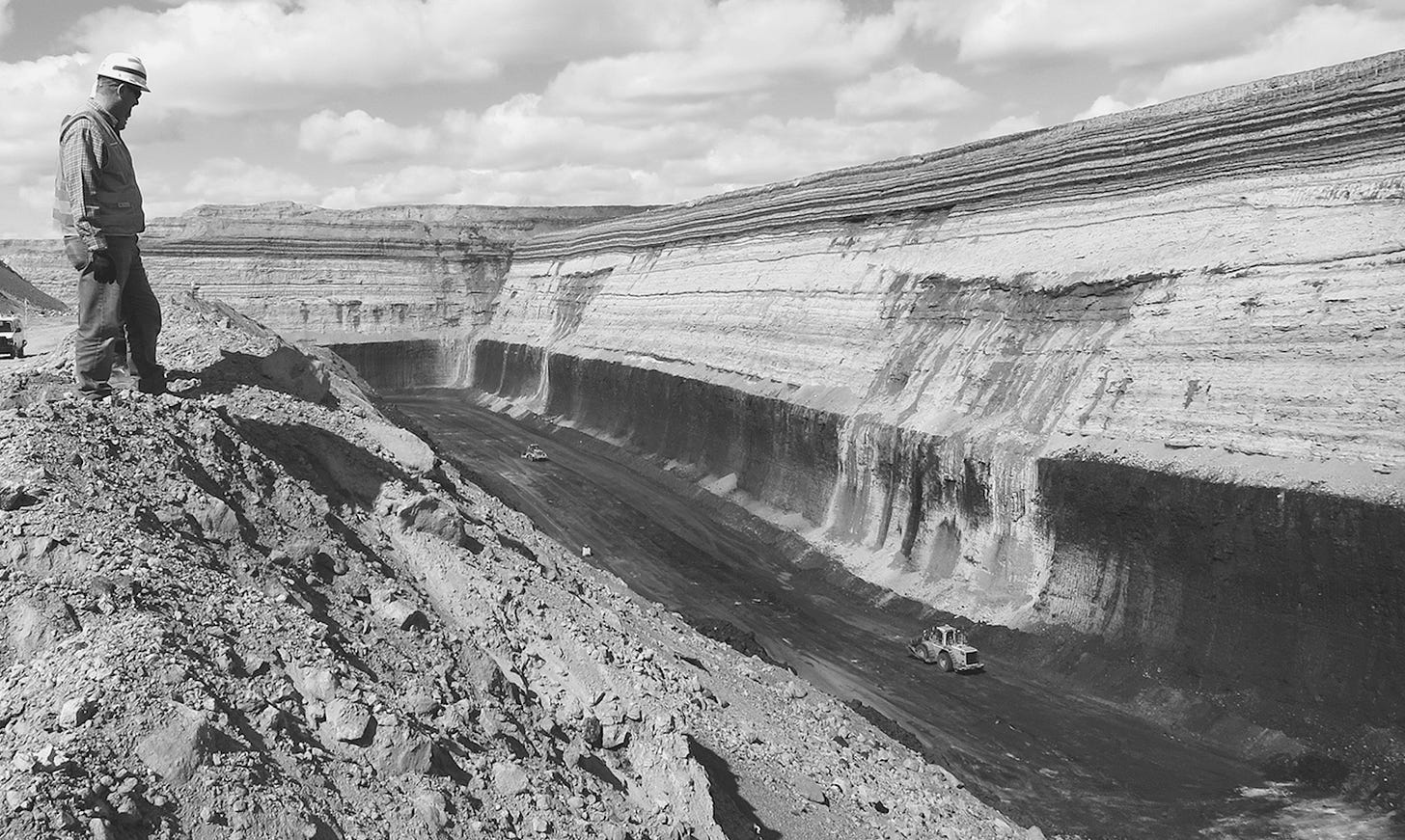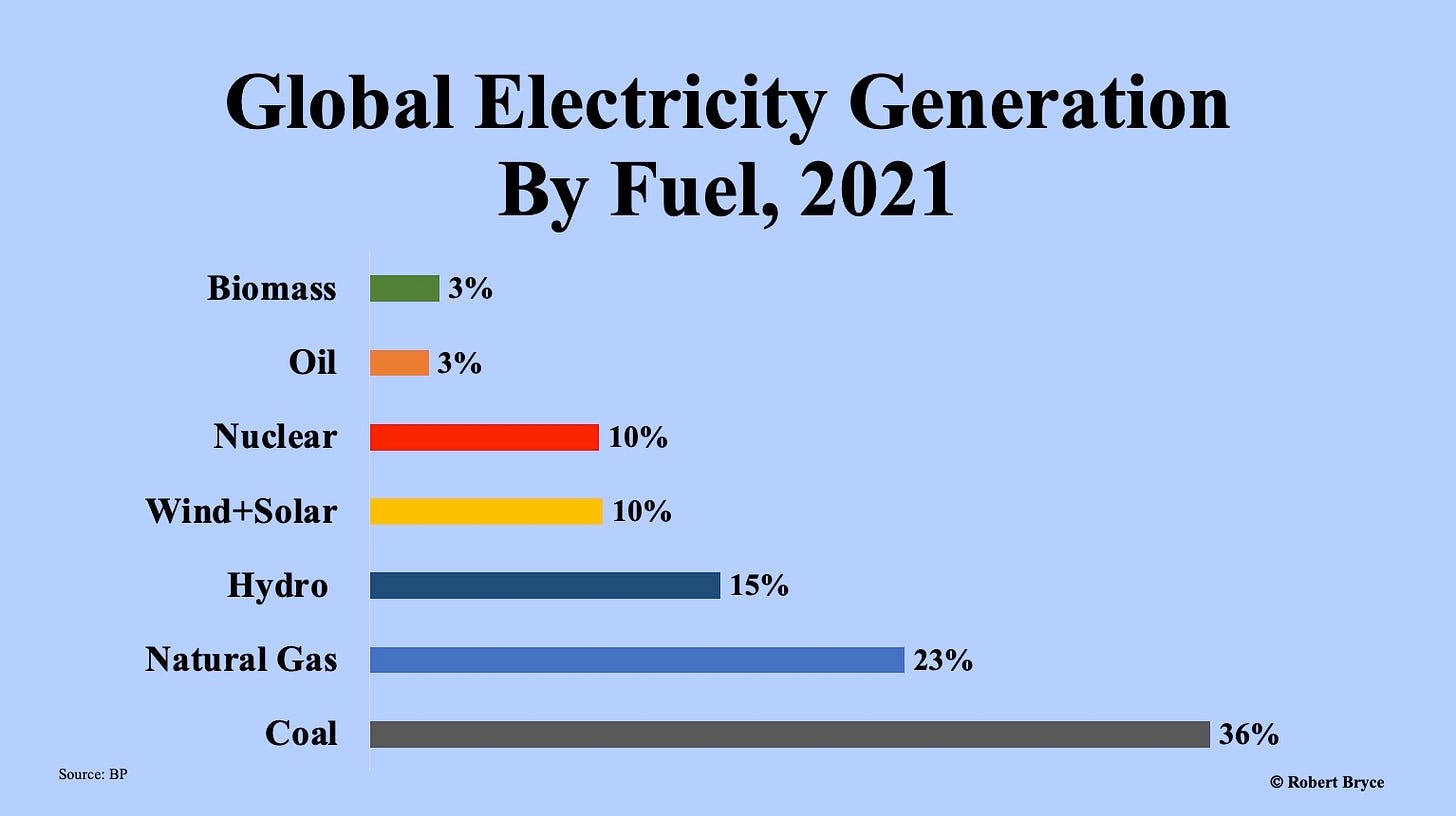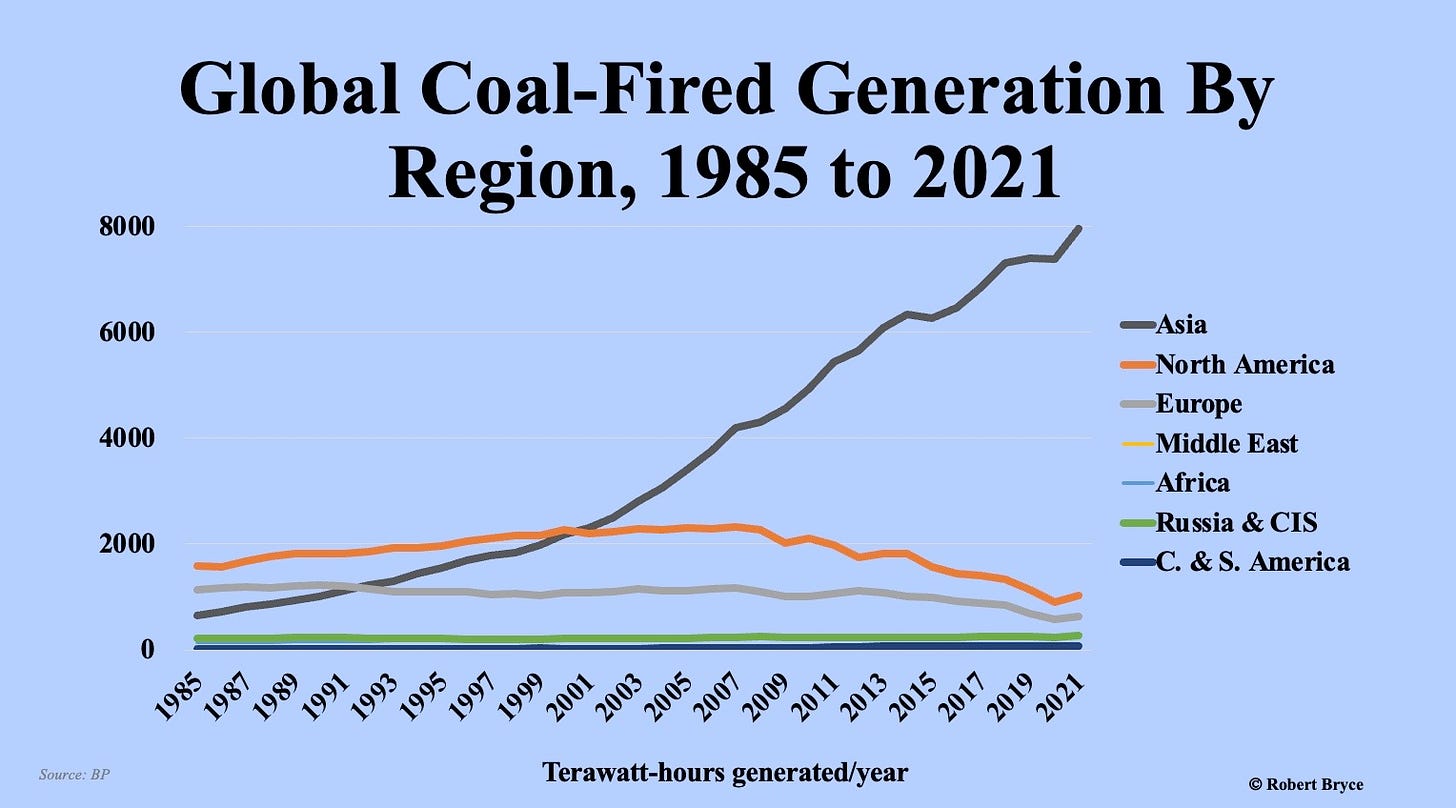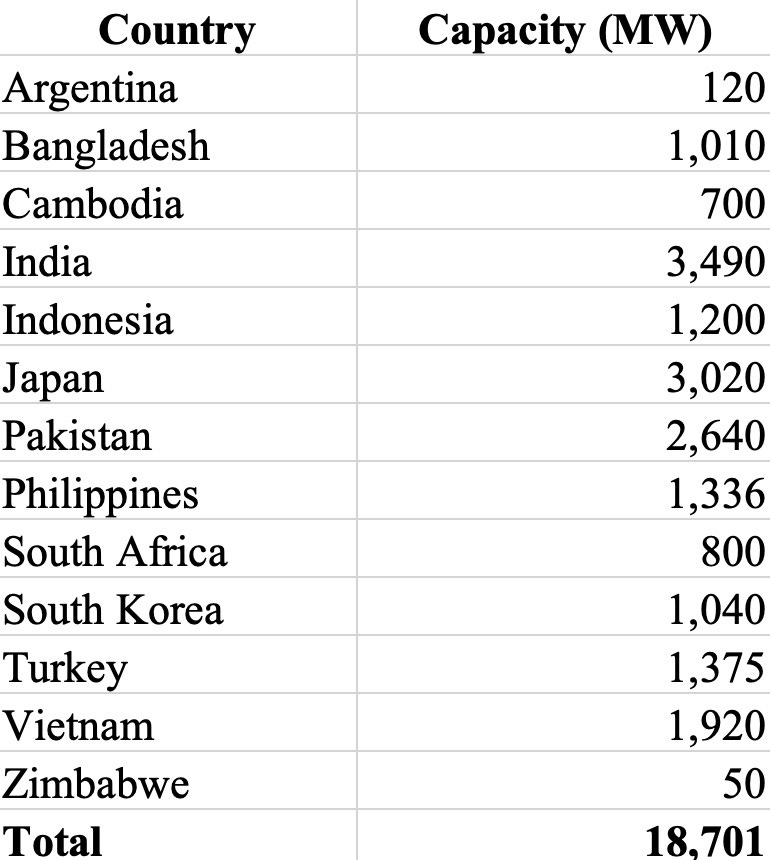The Iron Law Of Electricity Strikes Again As Vietnam Boosts Coal Burn
While Washington bureaucrats fiddle with hydrogen, developing countries are burning coal, lots of coal.

In mid-March, the Department of Energy announced it was offering $750 million for “research, development, and demonstration efforts to dramatically reduce the cost of clean hydrogen.” The agency claimed hydrogen is “set to play a vital future role in reducing emissions” and that “hydrogen development will strengthen America’s energy independence.”
On May 22, the DOE announced it was awarding some $42 million that will be spent on 22 projects in 14 states to “advance critical technologies for producing, storing, and deploying clean hydrogen.” In a press release, the agency said it was continuing to “make strides toward achieving President Biden’s Investing in America agenda — to reach a 100% clean electricity grid by 2035 and net-zero carbon emissions by 2050.” The release quoted Energy Secretary Jennifer Granholm as saying the spending plan is a “bold step” in the decarbonization effort and that the “bold investments are ensuring the U.S. leads the way in hydrogen technology.”
On June 5, the DOE announced a national “clean hydrogen strategy and roadmap” that “complements a historic $9.5 billion investment for clean hydrogen through the President’s Bipartisan Infrastructure Law” and the new “production tax credit for clean hydrogen” in the Inflation Reduction Act. It dutifully quoted Granholm saying the roadmap will “lay the foundation” for government and industry to “realize the full potential of this incredibly versatile energy resource.”
On June 12, one week after that latest batch of hydrogen hype from the DOE, India’s Ministry of Power ordered 15 power plants that burn imported coal to run at full output through September 30. As reported by CNBCTV18, the ministry invoked the “Electricity Act of 2003 to avoid any outage due to a sudden rise in power demand.” The move was the latest effort by the Indian government to avert blackouts as the country continues to grapple with soaring electricity demand growth.
Two days later, on June 14, the Vietnam News Agency reported that the country’s state-owned coal miner, Vinacomin, will boost production by 15% this year so that it can increase supplies of fuel to the country’s power stations. The announcement follows several weeks of rolling blackouts in Vietnam that are wreaking havoc on the manufacturers that have been flocking to the country. A June 12 Reuters article quoted Hong Sun, the chairman of the Korean Chamber of Commerce in Vietnam, who said, “Many factories have had to suspend production due to severe power cuts, and the cuts are regular...This is a very serious problem for South Korean companies operating in Vietnam.”
Despite significant investments in hydro, solar, and wind, Vietnam is now getting about 60% of its juice from coal-fired power plants. Since 2009, Vietnam’s coal-fired electricity output has grown tenfold and more growth is on the way. Last year, according to Global Energy Monitor, Vietnam commissioned about 1,900 megawatts of new coal-fired capacity. (More on Vietnam in a moment.)
The contrast between the rhetoric coming from the climate claque in Washington and the hard realities of electricity-impoverished countries like India, Vietnam, Pakistan, South Africa, and Bangladesh (which is also in the midst of an electricity crisis), could not be more stark. While the U.S. government is fire-hosing hundreds of billions of dollars on weather-dependent renewables and blue, green, and tutti-frutti hydrogen, developing countries — as well as advanced economies like Japan and Germany — are burning all the coal they can find. Why? The Iron Law of Electricity.
The Iron Law of Electricity says that people, businesses, and countries will do whatever they have to do to get the electricity they need. And for countries all over the world, that means burning coal, lots and lots of coal.
There’s no doubt that the Inflation Reduction Act has set off a feeding frenzy as the rent-seekers at big banks, big law firms, and big business look to take advantage of one of the biggest corporate giveaways in American history. (All of it done in the name of climate change, of course.) But the hard reality is that all of that spending won’t make a dent in the world’s unslakable thirst for electricity, which continues to be the globe’s most important and fastest-growing form of energy. That matters, of course, because the electricity sector is the biggest producer of global CO2 emissions, and coal combustion is the largest single source of those emissions.
To be sure, these coal realities don’t fit the narrative that is relentlessly promoted by the anti-industry industry, elite academics, climate activists, and their myriad allies in the legacy media, that we can run the world solely on weather-dependent renewables, batteries, and a big dose of hopium.
Yes, coal use in the U.S. and Europe is falling. But, as can be seen in the graphic above, coal-fired generation in Asia is soaring. And despite massive spending on renewables wind and solar are still only supplying about 10% of global electricity. Furthermore, coal’s share of global generation hasn’t budged in nearly 40 years. Since 1985, the carbon-heavy fuel has consistently been burned to generate between 36% and 40% of the world’s electricity.
Further, coal will stick around for a long time. Last December, the International Energy Agency reported “the current energy crisis has forced some countries to increase their reliance on coal in spite of climate and energy targets.” The agency also predicted that global coal demand will likely plateau, but is unlikely to peak until 2025. Also notable in that report was this line about the world’s most populous country: “India’s coal consumption has doubled since 2007 at an annual growth rate of 6% — and it is set to continue to be the growth engine of global coal demand.”
“the current energy crisis has forced some countries to increase their reliance on coal in spite of climate and energy targets.”
In March, the IEA released a report on CO2 emissions in 2022. The agency said “emissions from coal grew by 1.6% or 243 million tons” in 2022, “far exceeding the last decade’s average growth rate, and reaching a new all-time high of almost 15.5 billion tons.”
Much of this coal growth is happening in China, which accounts for more than half of all global coal consumption and a shade more than half (52%) of all the electricity generated from coal. Yesterday, June 16, Reuters reported that during the first five months of this year, coal-fired generation in China jumped by 6.6%. And that trend will continue. In February, Global Energy Monitor reported that China permitted about two new coal-fired power plants per week in 2022. The permitted plants will have “a staggering 106 gigawatts of new coal capacity...equivalent to 100 large coal-fired power plants.” The group also noted that “China has seen a rapid increase in electric peak loads...due to an increase in the prevalence of air conditioners and exceptionally intense heat waves. This is prompting an increase in coal power plant development.”
But it’s not just China.
In February, Pakistan announced it would quit importing liquified natural gas for its power sector and would instead quadruple the size of its domestic coal-fired generation capacity. The move came after a surge in global prices of LNG in the wake of Russia’s invasion of Ukraine. Pakistan Energy Minister Khurram Dastgir Khan declared “LNG is no longer part of the long-term plan," and that the country would increase its domestic coal-fired power capacity to 10 gigawatts (GW) a four-fold increase over the 2.3 GW of capacity now in place. As Reuters explained, “Pakistan's plan to switch to coal to provide its citizens reliable electricity underscores challenges in drafting effective decarbonization strategies.”
Japan, the home of the Kyoto Protocol, is also adding coal-fired capacity. As I reported in these pages in March, Japanese utilities are building a new 1,300-megawatt coal-fired power plant near Kurihama called Yokosuka that will be completed next year. Further, as can be seen in the list above, 13 countries (other than China) commissioned new coal plants last year. As you can see, many of those countries, including Bangladesh, Cambodia, and Pakistan, are among the world’s poorest. Together, those countries added nearly 19 gigawatts of new coal capacity. (China commissioned about 27 gigawatts last year.)
In February, Global Energy Monitor reported that China permitted about two new coal-fired power plants per day in 2022. The permitted plants will have “a staggering 106 gigawatts of new coal capacity...equivalent to 100 large coal-fired power plants.”
Now back to Vietnam, which is seeing some of the world’s fastest growth in power demand. Over the past decade, demand has grown by a staggering 9% per year and more is coming. On May 27, James Kennemer, a consultant who helps companies access manufacturing capacity in Asia, wrote that Vietnam will soon become the “premier location” for manufacturing “shoes, furniture, garments, and electronics...The world’s largest brands are opening factories in Vietnam: Apple, Samsung, Nike, Adidas, LG, Foxconn, and others are examples of companies that have shut down Chinese factories in favor of Vietnamese factories.”

He continued, saying Vietnam is “open for investment with little red tape” and that more factories are moving to the country, “especially after the U.S.-China trade war escalation.” He added that “big tech is moving into Vietnam...Apple recently started producing AirPods in Vietnam to cut down on import costs from China. Samsung has also moved into the country...The last few years have seen an increase of over 300% in electronics.” And here was the key line: the “average cost of hiring a factory employee in Vietnam is 1/3 those in China.”
The trends at work are obvious: in their never-ending search for cheap labor, huge multinational corporations are moving manufacturing from China to Vietnam.
China industrialized by burning massive amounts of coal. Now it’s Vietnam’s turn.
None of this should be surprising. As I explained in my 2014 book, Smaller Faster Lighter Denser Cheaper, coal has endured in the electric sector since Thomas Edison used it at the first central power plant on Pearl Street in 1882 for many reasons. “First among them: Coal remains a fuel of necessity for producing electricity. Demand for electricity throughout the world is soaring. Couple that demand with the fact that coal deposits are abundant, widely dispersed, easily mined, and are not influenced by any OPEC-like entities.”
All of those factors are still at work today. And recall that the gap between the electricity rich and the electricity poor is the defining inequality in the world today. The IEA recently estimated that about 800 million people around the world still have no access to electricity. The average resident of India (which has 1.4 billion inhabitants) consumes just 1,200 kilowatt-hours of juice per year. That’s about a third of the global average and a tenth of the U.S. average.
The punchline here is obvious: There is no path forward for global emissions reduction without massive decarbonization of electricity production, which — in theory, anyway — should be the easiest to decarbonize. But the ongoing growth in coal-fired generation shows how difficult decarbonization efforts will be. Further, replacing coal in the power sector cannot, will not, be done with renewables. It will have to be accomplished with nuclear energy, and lots of it. That will take time, sustained international commitment and cooperation, and hundreds of billions of dollars in new investment.
I will end by noting that the Indian government launched its biggest-ever auction for coal mining last year. The auctions occurred a few weeks after Power Minister Raj Kumar Singh said that India would add as much as 56 gigawatts of new coal-fired generation capacity by 2030. Explaining the move, Singh said, “My bottom line is I will not compromise with my growth...Power needs to remain available.”
Yet more proof of the Iron Law of Electricity at work.
Before you go:
Please click the ♡ button. And if you haven’t done so already, please subscribe and share.
Thanks.







I'm a petroleum engineer and have worked in Midland (Permian Basin) for 26 years. We have been using CO2 injection into oil reservoirs for enhanced oil recovery (EOR) since the 1970's. In the early 2000's, I can remember meetings and discussions around using methane to generate hydrogen to power the (then) new fuel cell technology for transportation. This is before the shale boom, and at the time the US was importing more and more crude as well as natural gas. It only made sense if nuclear power was used as the energy source to create the hydrogen, and the resulting CO2 byproduct was injected into oil reservoirs to increase oil production. The idea didn't gain much traction since the net energy loss in the process would guarantee bankrupting any company that tried it. Plus, the hydrogen molecule is so small that it will permeate most materials including steel, so an entire new delivery system would be required to get it to market. Leaking hydrogen might be an issue (Hindenburg?).
Now, thanks to green subsidies, the idea has returned. Billions will be spent studying the idea, and I bet it will never gain traction for the same reasons.
Hydrogen has a number issues well beyond the production aspect. There is zero infrastructure logistics distribution system, then consumers aren't there at all. Modular nuclear in theory solves this issue however, thanks to the Hillary, Russia is the main source of enriched fuel for nuclear plants. Need to move DC meetings into the heartland, and them make each one of them work a farm job for 2 yrs, forget law school and trying something useful like engineering where physics and thermo have to be honored.